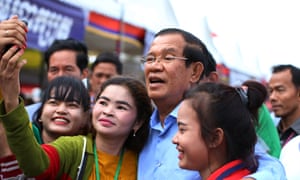 |
| Cambodian prime minister Hun Sen (centre) is seeking re-election as his government cracks down on ‘fake news’. Photograph: Xinhua/REX/Shutterstock |
Cambodia 'fake news' crackdown prompts fears over press freedom
Cambodia’s media has under come increasing pressure after the closure of one independent newspaper and sale of another
The Guardian | 6 July 2018
The Cambodian government is extending its crackdown on “fake news”, just weeks before the increasingly authoritarian government of prime minister Hun Sen heads to the polls.
A new directive aimed at fake news posted on websites and social media platforms could see violators jailed for two years and fined US$1,000, according to a report in the Khmer Times.
Websites will now also be required to register with Cambodia’s information ministry. Pos Sovann, an official from the ministry said the directive was effective immediately.
“We will start to take measures on Thursday. We have been preparing for a long time, and we have provided ample time for relevant ministries to review,” he was reported as saying.
A previous inter-ministerial directive issued in May announced powers to block media deemed a threat to national defence and security. At the time three ministries assigned specialised units to monitor social media posts.
Facing criticism the new rules were a further attempt to strangle freedom of expression in the lead up to the general election on 29 July, Sovann said Cambodia was joining the global battle against fake news.
“Fake news is not good for a real democracy, we want good news for our people,” he said.
A joint statement from 117 civil society organisations in Cambodia published by the Southeast Asian Press Alliance in June expressed concerns over the heightened state surveillance, saying the news rules would give “authorities the power to silence individuals at the click of a button”.
The widening powers come at a time when Cambodia’s free press has been under increasing pressure.
The recent sale of the Phnom Penh Post, an English-language daily considered one of the last independent media organisations in the country, was seen as a major blow to freedom of expression.
The paper was sold to a Malaysian investor who is the chief executive of a PR firm that has worked on behalf of Prime Minister Hun Sen.
The sale of the Post followed the closing of the Cambodia Daily last September, after the paper was saddled with a disputed $6.3m tax bill.
The final edition ran with the headline: “Descent into Outright Dictatorship.”
Hun looks set to extend his 33-year grip on power in elections later this month, after having dissolved the opposition party and jailed his main critics.
Across the region several governments in south-east Asia, including Singapore and the Philippines, have debated legislation on fake news.
Under its cyber security law, the spread of false information in Thailand carries a jail term of seven years, while in April Malaysia passed legislation that penalises fake news with a punishment of up to six years imprisonment and a fine of $123,000.


No comments:
Post a Comment